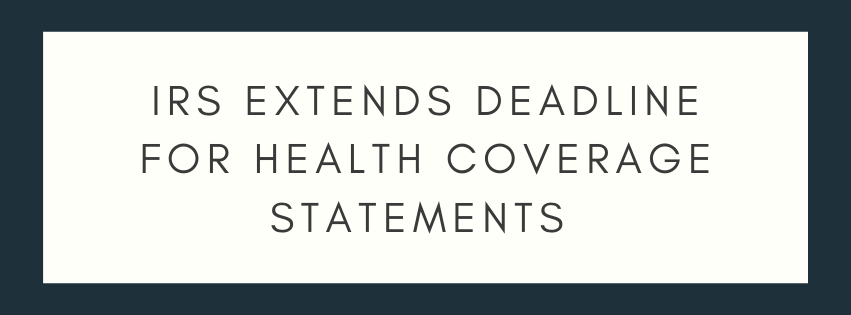Similar to previous years, the IRS had once again extended the deadline for sending health care statements such as Forms 1095-B (Health Coverage) and 1095-C (Employer-Provided Health Insurance Offer and Coverage) to individuals. Due to the requirements enacted by the Patient Protection and Affordable Care Act (PPACA) in recent years, employers and insurers have needed more time to gather and analyze the data needed to complete these documents. As a result, the due date for delivering these statements has been extended every year since the PPACA’s requirements went into effect.
According to Journal of Accountancy, Section 6055 of the PPACA requires employers, insurers, and government agencies who provide minimum coverage to file annual information returns about the coverage that they are providing to their workers. Section 6056 requires large employers with 50 or more full-time employees in the previous year to file similar information returns about the health insurance coverage it does (or does not) provide to full-time staff members. These requirements to provide statements can be satisfied by filing forms 1095-B and 1095-C, which are affected by the deadline extension.
This year, the deadline has been moved from January 31 to March 2, 2020. At this time the IRS has decided that there is no need for an extension to file the forms above or 1094-B, Transmittal of Health Coverage Information Returns, and Form 1094-C, Transmittal of Employer-Provided Health Insurance Offer and Coverage Information Returns, which are both due by February 28th, 2020 if filing in hard copy or March 31st, 2020 if e-filing. The normal extensions for filing forms 1095-B and 1095-C will not be available this year since the due date has already been modified to accommodate employers and insurers who need more time to gather the information needed to file. The IRS strongly advises businesses to provide these statements as early as possible rather than waiting until the deadline.
In addition to the extensions notated above, taxpayers who have made good-faith efforts to comply with 2019’s reporting requirements may be exempt from penalties under Sections 6721 and 6722. Taxpayers do not need the information provided on Form 1095-B in order to determine their federal tax liability or file their federal tax return due to the repeal of the individual shared-responsibility penalty, which affects tax years 2019 and later under the Tax Cuts and Jobs Act.
The IRS is still looking for feedback on reporting requirements and the adjustments they have made in response to recent changes in policy. To comment on the extension or respond to any other tax form concerns, you can visit the form on the IRS website here.
